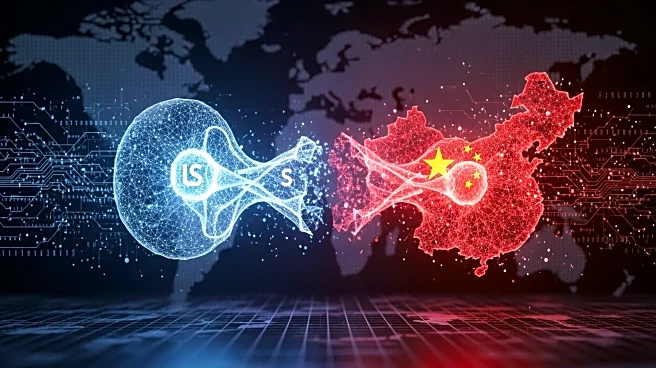What's Happening?
ASML, a Netherlands-based company known for its advanced lithography machines, is experiencing a significant drop in sales to Chinese customers due to escalating U.S.-China trade tensions. The U.S. government
has imposed export restrictions on advanced chipmaking tools, aiming to limit China's manufacturing capabilities. ASML's CEO, Christophe Fouquet, reported a strong third quarter but warned of a substantial decrease in sales to China next year. The Dutch government has also implemented licensing requirements affecting ASML's ability to sell its most advanced technology, extreme ultraviolet (EUV) lithography machines, to China. These machines are crucial for producing cutting-edge semiconductors, which are vital for the artificial intelligence industry.
Why It's Important?
The restrictions on ASML's sales to China highlight the broader geopolitical implications of U.S.-China trade tensions. Semiconductors are a critical component in various industries, including technology and defense. The U.S. aims to maintain its technological edge by limiting China's access to advanced chipmaking tools. This move could impact global supply chains and the semiconductor industry, potentially leading to increased prices and reduced availability of advanced technology products. The situation underscores the strategic importance of semiconductors in the ongoing rivalry between the U.S. and China.
What's Next?
The trade tensions between the U.S. and China are likely to continue affecting the semiconductor industry. ASML may need to explore alternative markets to offset the decline in Chinese sales. The U.S. government might further tighten export controls, impacting other companies involved in chip manufacturing. Additionally, China may intensify efforts to develop its domestic semiconductor industry to reduce reliance on foreign technology. These developments could lead to shifts in global trade patterns and influence future diplomatic relations between the two countries.
Beyond the Headlines
The trade tensions also highlight the strategic importance of rare earth minerals, which China dominates. These minerals are essential for various high-tech applications, including fighter jets and electric vehicles. The U.S. may need to secure alternative sources or develop domestic capabilities to mitigate reliance on Chinese exports. The situation raises ethical and economic questions about global resource distribution and the balance of power in international trade.









